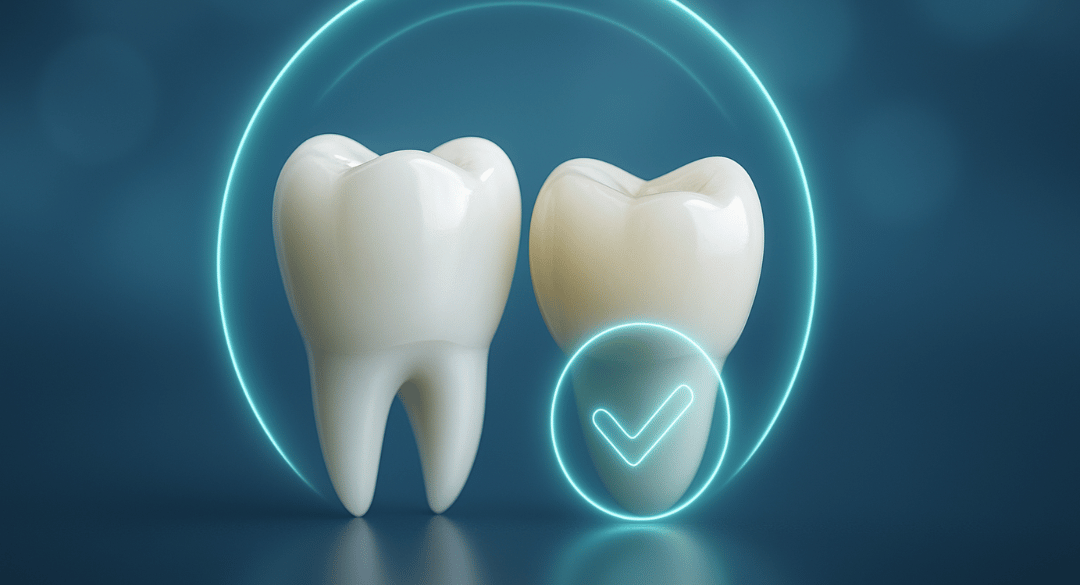Biocompatibility

What Does Biocompatibility Mean? (And Why It Matters to Your Mouth)
Ever get a rash from new jewelry or break out from a different skincare product? Then you already understand the basics of biocompatibility—it’s simply how well your body gets along with a foreign material.
When it comes to your dental work, this concept is critical. A crown isn't just a tooth-shaped cap; it’s a medical device that will live in your mouth for decades. Choosing a biocompatible material means finding one that your body will welcome like an old friend, not fight like an intruder. This is the key to avoiding chronic inflammation, allergic reactions, and ensuring the long-term health of the tissue around your restoration.
The Telltale Signs Your Dental Work Isn't Playing Nice
We see patients all the time who live with low-grade symptoms they never think to connect to their old dental crowns or bridges. It’s rarely dramatic, but it’s often persistent.
- "My gums are always a little puffy and red around that crown." While flossing is key, sometimes this is your body’s low-level inflammatory response to a material it doesn’t love.
- "I get this weird metallic taste sometimes." This isn't in your head. It can be a chemical reaction between the metal alloy in your crown and your own saliva.
- "My gum line turned dark." This is a classic sign of older PFM (Porcelain-Fused-to-Metal) crowns, where microscopic metal particles can leach into the gum tissue over time.
- "I've just had 'sensitive gums' for years." Many patients accept chronic sensitivity as normal, only to discover that replacing an old restoration with a more biocompatible one solves a problem they thought they had to live with.
The Hypoallergenic "All-Stars" of Dentistry
Fortunately, modern dental materials have evolved to work in harmony with your body. When biocompatibility is the top priority, these are our go-to choices:
- Zirconia: This is the hypoallergenic superstar. An advanced, 100% metal-free ceramic, zirconia is so biocompatible it’s used for medical implants like hip replacements. We have never seen a true allergic reaction to it, and gum tissue around zirconia crowns is consistently healthy and calm.
- Lithium Disilicate (e.max): This is a type of glass-ceramic prized for its beauty. Like zirconia, it is completely metal-free and exceptionally kind to the body. Its ultra-smooth surface is also resistant to plaque buildup, which further promotes healthy gums.
The Materials That Can Cause Issues
- Metal Alloys & Nickel Allergies: The most common culprit in dental material reactions is nickel, an alloy used in many traditional crowns. With 10-15% of the population having a nickel sensitivity (often discovered from costume jewelry), placing it in the mouth 24/7 can be a recipe for chronic irritation.
- Porcelain-Fused-to-Metal (PFM): This traditional crown has a metal core covered with porcelain. While strong, it carries all the potential risks of metal alloys, including allergic reactions and the classic dark line that can appear at the gumline.
Real Talk: When Should You Prioritize Biocompatibility?
While everyone benefits from healthier materials, you should absolutely make it a priority if:
- You have known metal allergies or sensitive skin.
- You have autoimmune conditions (your body is already in a state of heightened inflammation).
- You live with unexplained oral symptoms like chronic gum irritation or a metallic taste.
Here's what we want you to remember:
Biocompatibility is the principle of using materials that exist in harmony with your body. Choosing a highly biocompatible crown material like zirconia or e.max minimizes the risk of inflammation, allergic reactions, and other chronic issues, promoting better oral and overall health.
Every patient's situation is unique.
Your health history is just as important as the condition of your tooth. We take the time to understand your sensitivities and concerns before recommending a material. The best crown is one that your body accepts completely, allowing you to forget it’s even there.
Curious about which materials would work best for you?
Or wondering if your current dental work might be causing issues? We're here to give you honest, personalized answers. Schedule a consultation at our Woodland Hills practice – let's talk about what's really best for your smile.


